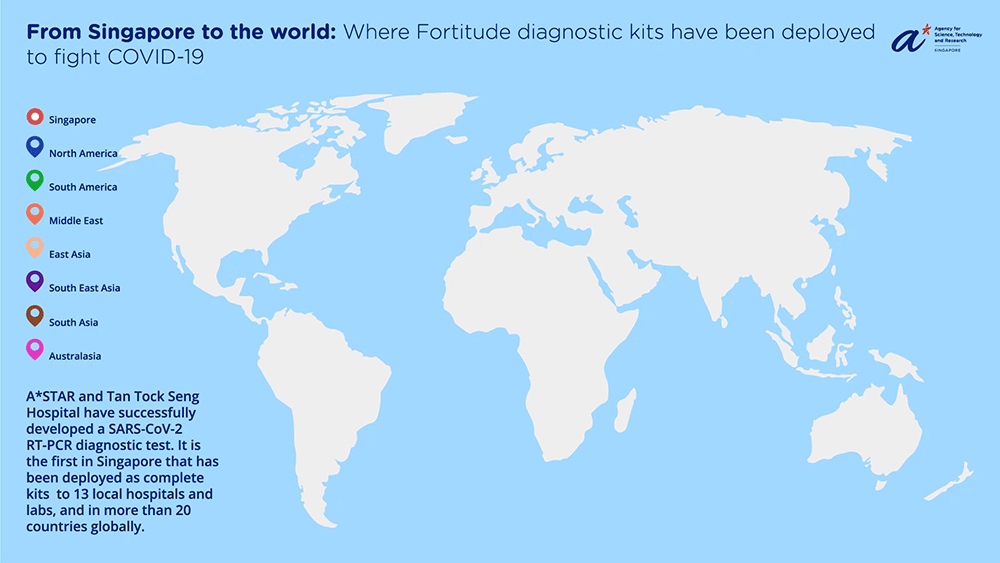A*STAR NEWS
From Singapore to the world: Where Fortitude Kit has been deployed globally
Close collaboration between scientists and the public health community have enabled the Fortitude Kit diagnostic to be quickly developed and deployed in Singapore hospitals to detect the SARS-CoV-2 virus that causes COVID-19. From February, Fortitude Kit has been in routine use in 13 Singapore hospitals and labs, public and private. Currently, it is also used by healthcare professionals globally to fight the novel coronavirus pandemic. To date, the kits have been deployed in more than 20 countries globally. See map below for where Fortitude Kit is now in use.

The kit was co-developed by A*STAR’s Experimental Drug Development Centre (EDDC), Bioinformatics Institute (BII), and the Department of Laboratory Medicine at Tan Tock Seng Hospital (TTSH). The Diagnostics Development (DxD) Hub supported the optimisation, verification, validation and production of these tests. DxD Hub is a national initiative led by A*ccelerate, the commercialisation arm of A*STAR.
The evolution of the SARS-CoV-2 virus is continually tracked by Dr Sebastian Maurer-Stroh, Deputy Executive Director (Research) of BII through the Global Initiative on Sharing all Influenza Data (GISAID) platform, which promotes the international sharing of all influenza virus sequences. This ensures the continual high accuracy of the Fortitude Kit in detecting the virus in COVID-19 patients. This also enables A*STAR to update or upgrade the Fortitude Kit on an ongoing basis to stay ahead of virus mutations.
A*STAR has transferred the technology know-how to biotechs through a non-exclusive license, to scale-up, and manufacture the diagnostic kits to further fulfil local and international demand.
Wall Street Journal Online: How diagnostic kits work
In an interview with the Wall Street Journal, Dr Sidney Yee, CEO of the DxD Hub shared that Reverse Transcription-Polymerase Chain Reaction (RT-PCR) is the gold standard method to detect the presence of pathogens. She highlighted that effective virus screening is also dependent on many factors such as transportation of patient samples to the lab, and the lab infrastructure to run the tests.
Was This Article Helpful ?
A*STAR celebrates International Women's Day

From groundbreaking discoveries to cutting-edge research, our researchers are empowering the next generation of female science, technology, engineering and mathematics (STEM) leaders.
Get inspired by our #WomeninSTEM
